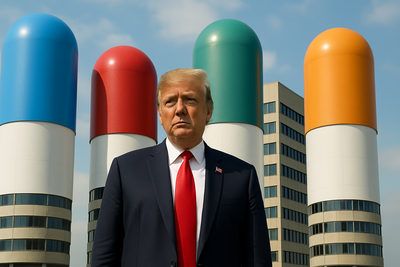ARTICLE AD BOX

US President Donald Trump said that he is likely to impose tariffs on imported pharmaceuticals by the end of the month, with levies on semiconductors possibly following soon after.
The announcement signals an escalation in his broader “reciprocal tariff” strategy, set to formally take effect from 1 August.Speaking to reporters on Tuesday (local time) after attending an AI summit in Pittsburgh, Trump said, “Probably at the end of the month, and we’re going to start off with a low tariff and give the pharmaceutical companies a year or so to build, and then we’re going to make it a very high tariff.” He added that tariffs on semiconductors were on a “similar” timeline and would be “less complicated” to enforce, Bloomberg reported.Earlier this month, Trump had already pledged a 50% tariff on copper and warned that pharmaceutical tariffs could rise as high as 200% after a one-year grace period for companies to shift production back to the US. His administration is pursuing these tariffs under Section 232 of the Trade Expansion Act of 1962, claiming that the volume of drug imports poses a national security threat.
If enacted, the pharmaceutical levies could directly impact multinational drugmakers such as Eli Lilly, Merck, and Pfizer, who rely heavily on overseas production. Meanwhile, chip tariffs are expected to affect not only semiconductor manufacturers but also consumer tech giants like Apple and Samsung, potentially driving up prices for smartphones and laptops.The threat comes as Trump has issued tariff letters to several trading partners in recent days, outlining import duties unilaterally, though he insists negotiations are still on the table. Earlier on Tuesday, Trump also announced a revised deal with Indonesia, cutting its proposed tariff rate from 32% to 19%, in exchange for multibillion-dollar US purchases, including 50 Boeing aircraft.



.png)
.png)
.png)
















 10 hours ago
3
10 hours ago
3









 English (US) ·
English (US) ·